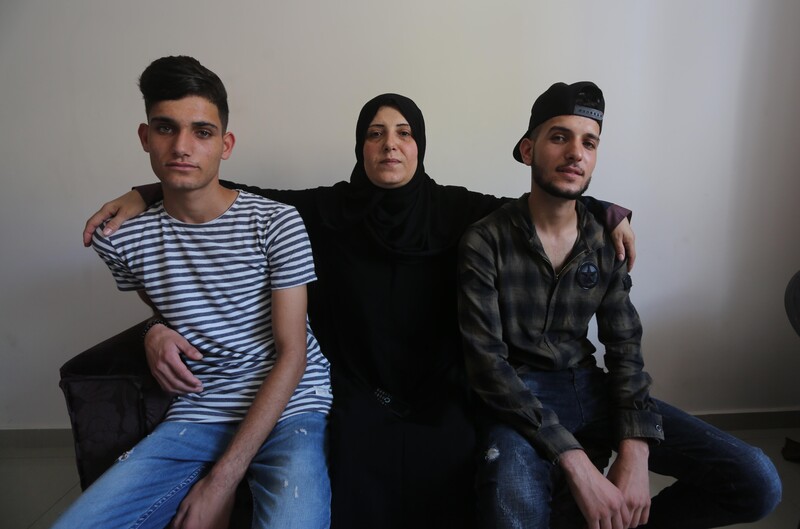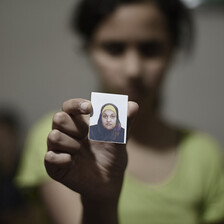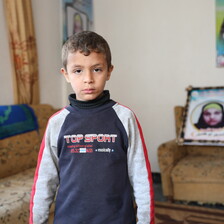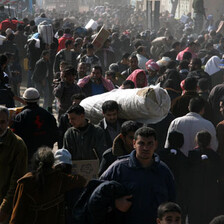The Electronic Intifada 21 September 2018

Hazem Abu Kmail and five of his children protesting at the premises of the International Committee of the Red Cross in Gaza City. Abu Kmail’s wife, the children’s mother, has been in Israeli detention since 2015.
The Electronic IntifadaIt’s hard to care for children as a single, unemployed parent. It’s almost impossible when official financial assistance is suddenly slashed in half.
This is what happened to Hazem Abu Kmail and his seven children. Since March, Abu Kmail, his four daughters and three sons have been hit by an apparent Palestinian Authority decision – officially denied – to cut allowances for Gaza families of prisoners associated with Hamas and Islamic Jihad held in Israeli jails.
The PA has officially denied yielding to pressure from Israel and the US to end what are stipends to help support the families of prisoners where typically the main breadwinner has been incarcerated.
At a weekly protest at the premises of the International Committee of the Red Cross in Gaza City where Abu Kmail and some dozen other families are protesting the conditions their loved ones are held in, Abu Kmail explained to The Electronic Intifada how the reduction in the PA stipend he receives has affected him.
In 2015, Abu Kmail’s wife, Nisreen Hassan, was detained by the Israeli military and charged with spying for militant groups by taking photos of Israeli military sites. She was arrested, according to Abu Kmail, after being summoned to the Erez checkpoint ostensibly in order to take possession of some official paperwork.
Both he and Hassan have denied the allegations.
Since then and until March, Abu Kmail, an otherwise impoverished street hawker, relied on a regular monthly allowance of around $850 provided by the PA. Over the past several months, however, this amount has been reduced by half for some families, he and others charge.
Pressure
PA payments to families of prisoners have been under increasing scrutiny as the US administration of Donald Trump seeks to pile pressure on the Palestinians, moving the US embassy to Jerusalem and ending funding of UNRWA, the UN agency for Palestine refugees.
Palestinians consider those arrested for resisting Israel’s occupation, violently or otherwise, to be political prisoners. And as of August, prisoner rights organization Addameer put the total number of political prisoners in Israeli detention at 5,781.
Israel calls them security prisoners, however, and both Israel and the US charge that PA payments in support of their relatives – “terrorists and their families,” in the words of Benjamin Netanyahu – amount to a reward.
In March, the US passed the so-called Taylor Force Act – named after an American who was killed in a knife attack in Jaffa in 2016 – as part of a large budget bill. The act will see the US cut aid to the PA – with some exceptions including for the PA’s budget which supports security coordination with Israel in the West Bank – over stipends it grants the families of prisoners.
In July, Israel similarly passed a bill that allows it to deduct the amount Israel has determined the PA pays these families. Israel has set that number at some $333 million.
The PA says it is refusing to end the stipends, however. In July, Mahmoud Abbas, PA leader, said he was adamant that the stipends would continue: “Even if we only have a penny left, we will give it to the martyrs, the prisoners and their families.”
Yet families of Hamas and Islamic Jihad prisoners in Gaza saw their stipends halved in March, according to Islam Abdo, an official with Gaza’s ministry of detainee affairs. Only the families of prisoners from factions in the Palestine Liberation Organization – Fatah, the Popular Front for the Liberation of Palestine and others – still receive their full stipends in Gaza, said Abdo.
These allowances should be delivered to families of all detainees without regard to political affiliations, Abdo told The Electronic Intifada.
A breach of all norms
According to Abdo and Hassan Abedrabo, a spokesperson for the Ministry of Detainees and Ex-Detainees Affairs in Gaza, the families of some 140 prisoners are affected, all the families of Hamas and Islamic Jihad detainees from Gaza.
According to the ministry of detainee affairs, there are currently 350 Palestinian detainees from Gaza in Israeli detention.
Abedrabo told The Electronic Intifada that his department was trying to get to the bottom of the issue with the PA administration in Ramallah.
“We believe that the issue is political and we are very concerned that all detainees, irrespective of their political affiliations, should be kept away from any political controversies or the current political split.”
The PA government spokesperson in Ramallah referred this reporter to the finance ministry from which, despite repeated attempts, no comment could be drawn.
Some analysts denounced the move as an attempt by the PA in Ramallah to extract concessions from Hamas in Gaza.
“This is a flagrant breach of all norms,” said Adnan Abu Amer, head of the political science department at Ummah University in Gaza. “Hamas is not going to succumb. On the contrary, the measures will likely undermine the legitimacy of the PA itself since the measures inflict serious financial harm on many households in Gaza, among them families of those freedom fighters.”
Whatever the political reality, some families are clearly suffering as a result.
“Since I began receiving half the normal allowance, I have been saddled with debts of more than [$500],” said Abu Kmail, who said he was now struggling to clothe his children.
Peace and dignity

Ruwaida, widow of Tayseer Alareer, with two of their children at their home in the Shujaiya neighborhood east of Gaza City.
The Electronic Intifada“During the last Eid [a traditional time of gift giving], I was unable to buy new clothes for my kids. Had it not been for my wife’s lawyer [a Palestinian citizen of Israel] helping out, they would have had nothing for the holidays.”
It is not just families of prisoners that worry about the consequences of the financial pressure being brought to bear on the PA. Others who rely on PA stipends are deeply concerned even if they have yet to see any effect on their income.
The family of Tayseer Alareer, from the Shujaiya neighborhood east of Gaza City, has been receiving a monthly allowance of some $700 since he was killed in 2001.
Alareer was shot by Israeli occupation forces while tending his land near the boundary with Israel and left his widow, Ruwaida, as the sole provider for four children.
“Throughout the past many years, with no relative able to support, I have been taking the role of family head,” Ruwaida said. “We have been getting by with the help of the monthly allowance. It allows us some sort of dignity.”
The allowance has only covered living costs, however. During Israel’s assault on Gaza in 2014, whole areas of Shujaiya were destroyed, including the house of the Alareer family. And while the building itself was rebuilt with international support, she had to furnish her home herself.
With growing children and unforeseen costs, the budget is straining and Ruwaida is watching the Israeli and US financial pressure on the PA with growing alarm.
“Last month, I had to pay about $150 for the graduation ceremony of my daughter,” Ruwaida told The Electronic Intifada. “I have been doing my best to spend on my children. Every day there are costs for food and bills. And though I am bitter at being widowed in this way, I have never taught my sons to take revenge. I only want them to live in peace and dignity.”
The PLO-linked Association for the Wounded and Martyrs’ Families in Gaza City told The Electronic Intifada that the PA is doing its best to withstand US and Israeli financial pressure.
“The Palestinian Authority has rejected this pressure and declared that all monthly allowances provided to families of those killed or injured, will continue to flow. This is a moral and national obligation by the PA towards those victims of an Israeli military occupation,” Mohammad Jouda al-Nahhal, director of the organization, told The Electronic Intifada.
Al-Nahhal confirmed that all such families will continue to receive their monthly allowances regularly without any delay.
But Saleh Abdel Ati, Gaza head of the Masarat Center for Policy Research and Strategic Studies, said the PA was lying if it claimed that all families of prisoners were still receiving their full monthly stipends.
“Several detainees of those affected by the cuts are in touch with me personally,” Abdel Ati told The Electronic Intifada.
“The Palestinian Authority should not bow to either American or Israeli pressure with respect to funds for Palestinian martyrs or detainees. Those people have sacrificed their lives on the path of freedom. Palestinian laws honor them.”
And punishing relatives, said Abu Kmail, will only cause more problems.
“Depriving people of dignity will only anger and frustrate them. The Great March of Return protests show just how desperate people in Gaza have become.”
Rami Almeghari is a journalist and university lecturer based in Gaza.





